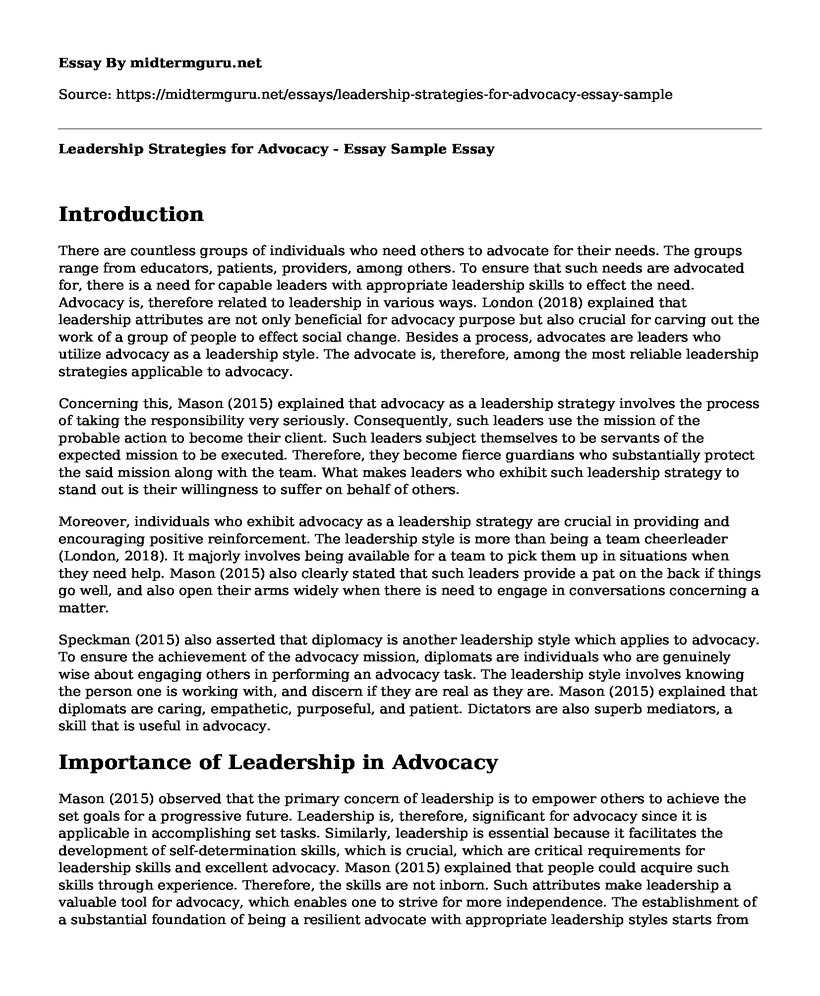Introduction
There are countless groups of individuals who need others to advocate for their needs. The groups range from educators, patients, providers, among others. To ensure that such needs are advocated for, there is a need for capable leaders with appropriate leadership skills to effect the need. Advocacy is, therefore related to leadership in various ways. London (2018) explained that leadership attributes are not only beneficial for advocacy purpose but also crucial for carving out the work of a group of people to effect social change. Besides a process, advocates are leaders who utilize advocacy as a leadership style. The advocate is, therefore, among the most reliable leadership strategies applicable to advocacy.
Concerning this, Mason (2015) explained that advocacy as a leadership strategy involves the process of taking the responsibility very seriously. Consequently, such leaders use the mission of the probable action to become their client. Such leaders subject themselves to be servants of the expected mission to be executed. Therefore, they become fierce guardians who substantially protect the said mission along with the team. What makes leaders who exhibit such leadership strategy to stand out is their willingness to suffer on behalf of others.
Moreover, individuals who exhibit advocacy as a leadership strategy are crucial in providing and encouraging positive reinforcement. The leadership style is more than being a team cheerleader (London, 2018). It majorly involves being available for a team to pick them up in situations when they need help. Mason (2015) also clearly stated that such leaders provide a pat on the back if things go well, and also open their arms widely when there is need to engage in conversations concerning a matter.
Speckman (2015) also asserted that diplomacy is another leadership style which applies to advocacy. To ensure the achievement of the advocacy mission, diplomats are individuals who are genuinely wise about engaging others in performing an advocacy task. The leadership style involves knowing the person one is working with, and discern if they are real as they are. Mason (2015) explained that diplomats are caring, empathetic, purposeful, and patient. Dictators are also superb mediators, a skill that is useful in advocacy.
Importance of Leadership in Advocacy
Mason (2015) observed that the primary concern of leadership is to empower others to achieve the set goals for a progressive future. Leadership is, therefore, significant for advocacy since it is applicable in accomplishing set tasks. Similarly, leadership is essential because it facilitates the development of self-determination skills, which is crucial, which are critical requirements for leadership skills and excellent advocacy. Mason (2015) explained that people could acquire such skills through experience. Therefore, the skills are not inborn. Such attributes make leadership a valuable tool for advocacy, which enables one to strive for more independence. The establishment of a substantial foundation of being a resilient advocate with appropriate leadership styles starts from one's family (upbringing), peers, education, among other experiences which are crucial in developing the skills. The aim of these is to establish the strong capacity of the child to become a leader besides being a self-advocate based on their individual experience.
Conclusion
In conclusion, advocacy leadership brings social change, which helps patients, providers, and educators, to name just a few. To achieve social change through advocacy, there is a need to exhibit patient since social change is a slow process. The process of advocacy requires perseverance and hard work, besides the above-highlighted leadership strategies.
References
London, M. (2018). Leadership and advocacy: Dual roles for corporate social responsibility and social entrepreneurship. In Contemporary Issues in Leadership (pp. 259-278). Routledge.
Mason, D. P. (2015, November). Advocacy in nonprofit organizations: A leadership perspective. In Nonprofit Policy Forum (Vol. 6, No. 3, pp. 297-324). De Gruyter.
Speckman, M. (2015). Student leadership and advocacy for social cohesion: A South African perspective. African Journal on Conflict Resolution, 15(3), 61-84.
Cite this page
Leadership Strategies for Advocacy - Essay Sample. (2023, Jan 15). Retrieved from https://midtermguru.com/essays/leadership-strategies-for-advocacy-essay-sample
If you are the original author of this essay and no longer wish to have it published on the midtermguru.com website, please click below to request its removal:
- Alignment Between Organizational Strategy and Structure - Paper Example
- The Need for Gun Control - Essay Example
- Paper Example on Safety and Quality Outcome
- Paper Example on Project Management Tools
- Assignment Example on Workplace Safety
- Nonprofit Leaders: Necessary Skills & Qualities for Success - Essay Sample
- Leadership: Key to Organization Direction & Success - Essay Sample







